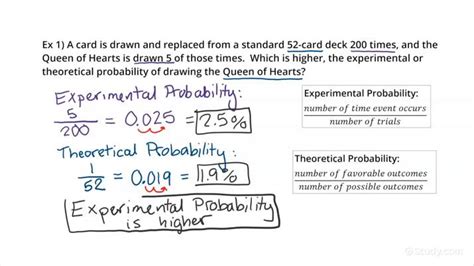how to compare experimental and theoretical results|Experimental versus theoretical probability simulation : Bacolod The difference between theoretical and experimental probability is that theoretical is based on knowledge and mathematics. Experimental probability is based on trials or. ติดต่อ PayPal เพื่อหาคำตอบสำหรับทุกคำถามที่คุณมีเกี่ยวกับการชำระเงินออนไลน์ หรือแม้แต่วิธีสมัครใช้บริการ PayPal เป็นผู้ .

how to compare experimental and theoretical results,Experimental probability is the results of an experiment, let's say for the sake of an example marbles in a bag. Experimental probability would be drawing marbles out of the bag and recording the results. Theoretical probability is calculating the .

Theoretical and experimental probability: Coin flips and die rolls. Google .
how to compare experimental and theoretical resultsTheoretical and experimental probability: Coin flips and die rolls. Google .
This would be experimental because the action is actually being executed. . The difference between theoretical and experimental probability is that theoretical is based on knowledge and mathematics. Experimental probability is based on trials or.Steps for Comparing Experimental and Theoretical Probability. Step 1: Find the experimental probability of the event as a percentage. Step 2: Find the theoretical probability of the event as.In this section, we compare experimental probability and theoretical probability. Experimental probability is the probability of an event occurring based on experimental .Theoretical and experimental probability: Coin flips and die rolls. Google Classroom. Microsoft Teams. Probability tells us how likely something is to happen in the long run. .In an experiment, two dice are rolled 50 times and the sum of the faces are recorded in a chart, as shown at the right. 1) What is the experimental probability of rolling an 8? 2) What is the theoretical probability of . This would be experimental because the action is actually being executed. Theoretical would be a base probability that doesn't change. Experimental can change based on the results of the experiment (hence the name).
how to compare experimental and theoretical results Experimental versus theoretical probability simulation Experimental and Theoretical Probability. Understand and compare experimental and theoretical probability. Example: a) Find the theoretical probability of obtaining doubles .Experimental versus theoretical probability simulation Learn how to determine theoretical probability and set up an experiment to determine the experimental probability.
The same re- sults were nearly obtained for the other tests as shown in Table 3. Table 3 shows the comparison for the ultimate loads and deflection between experimental and finite element results . The Theoretical value in chemistry, physics or science experimentation in general, is the established ideal value you would expect as a result of an experiment. Other terms you may see to represent this value .
Since you are only dealing with mean values and their standard errors, you can rephrase the task as comparing the (assumed) norm distribution of the sample mean and the distribution of the theoretical mean (and its variation, given a certain sample size). Compare experimental and theoretical probability to interpret dataIn this lesson you will learn how to interpret a set of data by comparing experimental and . Dear users, The situation I have encountered is a simple statistical comparison of the experimental data, which accepted as correct, with the results obtained via six theoretical models. In the experimental data, there exist y values corresponding to x values and also the measurement errors of y values. In theoretical .
Comparison Tests. Comparing the sample to the true value. Method #1. The t-test is used to determine if there is a significant difference between an experimental average and the population mean (µ) or "true value". This method is used to compare experimental results to quality control standards and standard reference materials.
Theoretical value is the value a scientist expects from an equation, assuming perfect or near-perfect conditions. Experimental value, on the other hand, is what is actually measured from an experiment. Rarely (in fact never) are these numbers the same. Take the area of a sheet of paper.

This would be experimental because the action is actually being executed. Theoretical would be a base probability that doesn't change. Experimental can change based on the results of the experiment (hence the name). ( 2 votes) Upvote.
how to compare experimental and theoretical results|Experimental versus theoretical probability simulation
PH0 · Theoretical vs. experimental probability
PH1 · Theoretical vs. Experimental Probability: How do they differ?
PH2 · Theoretical vs. Experimental Probability
PH3 · Theoretical and experimental probability: Coin flips and die rolls
PH4 · Theoretical and experimental probabilities (video)
PH5 · Theoretical and experimental probabilities
PH6 · Theoretical and Experimental Probability (solutions, examples
PH7 · Theoretical Probability Versus Experimental Probability
PH8 · Experimental vs Theoretical Probability
PH9 · Experimental vs Theoretical Probability
PH10 · Experimental versus theoretical probability simulation
PH11 · Comparing Experimental and Theoretical Probability